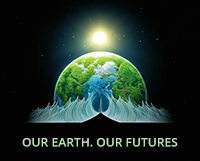How schools are involved
Teachers from three schools in the Maldives and four schools in Oxfordshire and Gloucestershire are taking part in Our Earth, Our Futures. The schools range from tiny village schools to large city and island schools.
Supported by the researchers through workshops and meetings, the teachers are planning and running classroom projects with a focus on empathy, global citizenship, sustainability and social and environmental justice.

The students will be invited to create and share art and other digital texts about their perspectives on local environmental issues, their aspirations for their future spaces, and their active roles as global citizens. Online video calls and digital platforms will support the interaction between the students in the two countries.
The project started in June 2024 with the first Maldivian schools being recruited, and will end with presentations and exhibitions in December 2025.
